About the Editor
Michael F. Bird is lecturer in theology at Ridley Melbourne College of Mission and Ministry in Melbourne, Australia.
Other Contributors
Craig A. Evans is Payzant Distinguished Professor of New Testament at Acadia Divinity College, Acadia University, in Wolfville, Nova Scotia, Canada.
Simon J. Gathercole is senior lecturer in New Testament at the University of Cambridge.
Charles E. Hill is professor of New Testament at Reformed Theological Seminary in Orlando, FL.
Chris Tilling is tutor in New Testament Studies at St. Mellitus College in London.
Overview
The team of authors respond to Bart Ehrman’s large-scale project of questioning traditional Christian claims and the concept of orthodoxy. The authors particularly focus on the early high Christology of the church and offer a critical response to Ehrman’s recent book How Jesus Became God: The Exaltation of a Jewish Preacher from Galilee.
Table of Contents
1. The Story of Jesus as the Story of God (Michael F. Bird)
2. Of Gods, Angels, and Men (Michael F. Bird)
Excursus 1: Kings, Angels, and Holy Men
3. Did Jesus Think He was God? (Michael F. Bird)
4. Getting the Burial Traditions and Evidences Right (Craig A. Evans)
5. What Did the First Christians Think about Jesus? (Simon Gathercole)
6. Problems with Ehrman’s Interpretive Categories (Chris Tilling)
7. Misreading Paul’s Christology: Problems with Ehrman’s Exegesis (Chris Tilling)
8. An Exclusive Religion: Orthodoxy and Heresy, Inclusion and Exclusion (Charles E. Hill)
Excursus 2: Second-Century Evidence for Jesus as God: Pagan, Early Orthodox, and Gnostic Testimony
Excursus 3: Second-Century Evidence for Jesus as God: The Nomina Sacra
9. Paradox Pushers and Persecutors? (Charles E. Hill)
Excursus 4: Third Century Evidence for Jesus as God: The Alexamenos Graffitio
Excursus 5: Third-Century Evidence for Jesus as God: The Inscription at Meggido
10. Concluding Thoughts (Michael F. Bird)
Summary
Chapter 1
The Story of Jesus as the Story of God
(Michael F. Bird)
Michael Bird critiques Bart Ehrman’s guiding question in How Jesus Became God: The Exaltation of a Jewish Preacher from Galilee, namely, When or how did Jesus become God? Bird criticizes the question in that it assumes an evolutionary model for Jesus becoming God, rather than his always simply being God. To fill out the scope of this basic misunderstanding on Ehrman’s part, Bird cites what he calls “the early high Christology club,” consisting of Martin Hengel, Richard Bauckham, and Larry Hurtado. These scholars argue that, rather than following an evolutionary trajectory where Christ’s status gradually rises in church opinion over time until he is regarded divine, there is something like a “big bang” of high Christology very early in church history.
Hengel argues that there is not an ascent from low to high Christology, for instance, on the road to Nicea in AD 325; rather, within the pages of the NT itself, we find a very sudden high …
[To continue reading this summary, please see below....]
The remainder of this article is premium content. Become a member to continue reading.
Already have an account? Sign In
